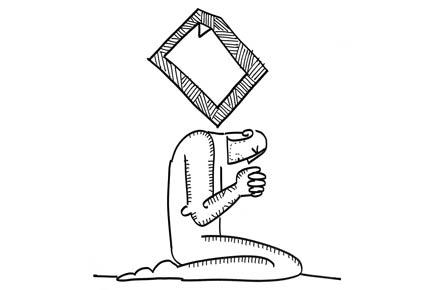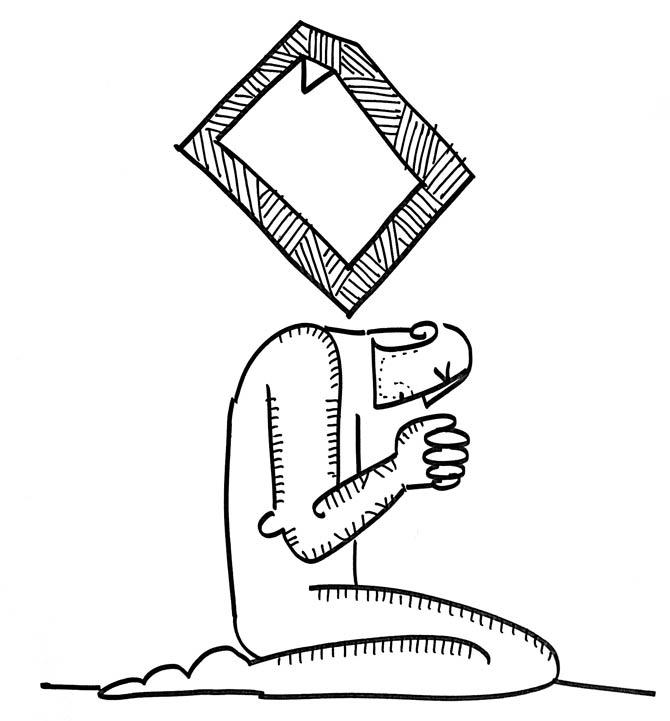A stone, a statue, a lump of turmeric, a pot, anything can be turned into a deity, in Hindu rituals


Illustration/Devdutt Pattanaik
ADVERTISEMENT
 A stone, a statue, a lump of turmeric, a pot, anything can be turned into a deity, in Hindu rituals. The process is called prana-prathishtha. Ritually, an object is made divine for a finite period of time. After that period, the divinity leaves the venerated object, and the object — like a corpse — is consigned to water. Thus, the ritual mimics the cycle of life and death. So it is with currency notes. One day, a piece of paper has value. Rupees 500. Rupees 1,000. The next day it does not. Only here, the avahan (invocation) and the visarjan (farewell) is done by the state, embodied in the Prime Minister and implemented through the Reserve Bank of India.
A stone, a statue, a lump of turmeric, a pot, anything can be turned into a deity, in Hindu rituals. The process is called prana-prathishtha. Ritually, an object is made divine for a finite period of time. After that period, the divinity leaves the venerated object, and the object — like a corpse — is consigned to water. Thus, the ritual mimics the cycle of life and death. So it is with currency notes. One day, a piece of paper has value. Rupees 500. Rupees 1,000. The next day it does not. Only here, the avahan (invocation) and the visarjan (farewell) is done by the state, embodied in the Prime Minister and implemented through the Reserve Bank of India.
This unique ability of humans to infuse value and meaning into anything is called maya. According to Yuval Harare, author of Sapiens, it is the collective fiction that sustains humanity. It helps us collaborate and establish societies. As a historian, who is an outsider, he has the luxury of calling it ‘fiction’ — but it is ‘fact’ for the insider. It is perhaps more respectful to call these narratives myths, subjective truths, real for believers, unreal for non-believers.
Maya is not illusion (something that does not exist). It is delusion (a deliberate misunderstanding of what does exist). Printed paper does exist. It’s a fact. That it is money is a belief, like justice, like equality, like God. The state functions like a priest, establishing God and justice and equality through ritual and argument. Once we buy into the narrative, god, justice, equality, and money becomes real.
Without myths, there can be no culture. Myths, hence cultures, are a function of place, time and people. For example, 2,500 years ago, in Babylon, no one would have understood words like Allah or Jesus, but they would have understood Marduk, the supreme God, the most powerful god of that time. Likewise, the Indian Rupee note, issued by the Indian state, would have made no sense to the Buddha, or to Chandragupta or Chanakya.
Indian philosophy distinguishes between truths dependent on a context (maya) and truths independent of context (satya). The human ability to create value is eternal, hence satya. But what humans value — be it money, or state, or politicians, or ideology, or deity — is temporary, hence maya. Food is satya. Money is maya. Starvation is satya. But poverty? That’s a tough one. For the sage who is naked, who has no possessions, is technically a ‘have-not’, but he does not consider himself poor.
The most primitive tribe in the world will understand human craving for food. But, not everyone will understand the modern obsession for bundles of printed paper, or digits in a database, appearing on a screen, that has the power to make a person rich, or poor, powerful or powerless.
People make fun of people who worship stones because here both parties have not bought into the myth. But, no one makes fun of people who stash paper in their homes, or smile gleefully on seeing numbers received on a smart phone app, because everyone has bought into the myth of money. Such is the power of myth. Recognition of this has led sages to popularise that ubiquitous Indian phrase, ‘Sab maya hai!’
The author writes and lectures on the relevance of mythology in modern times. Reach him at devdutt@devdutt.com
 Subscribe today by clicking the link and stay updated with the latest news!" Click here!
Subscribe today by clicking the link and stay updated with the latest news!" Click here!






